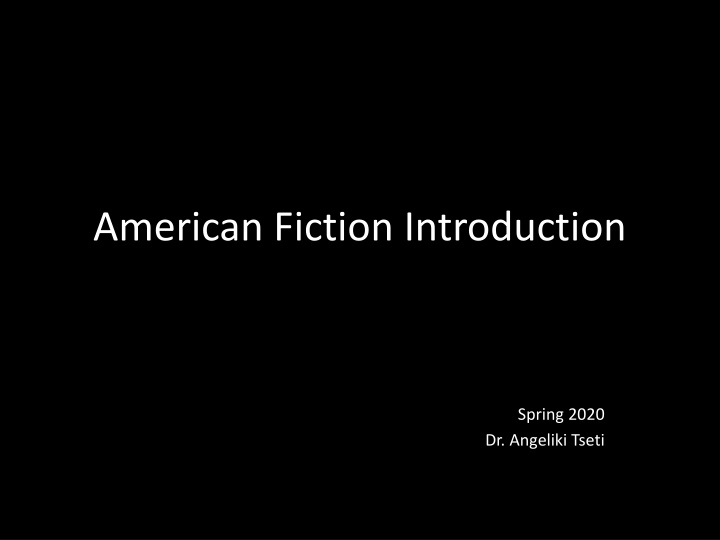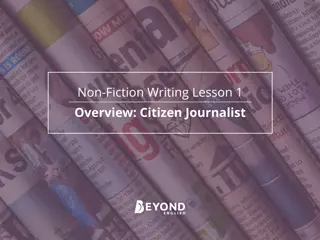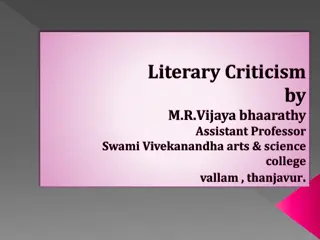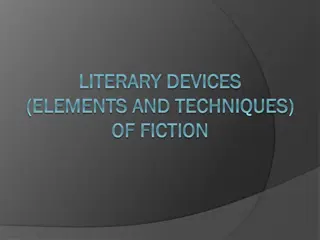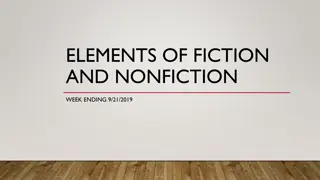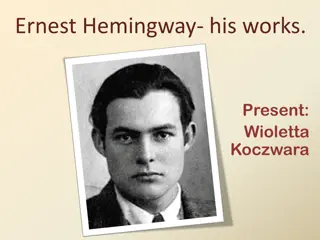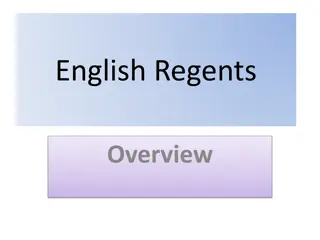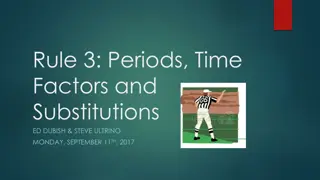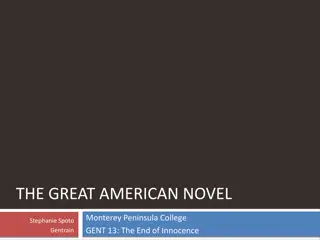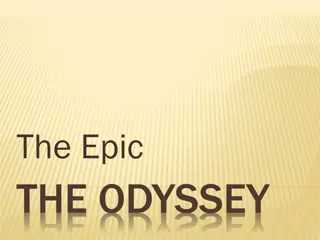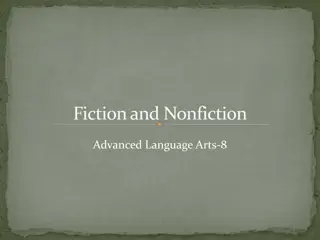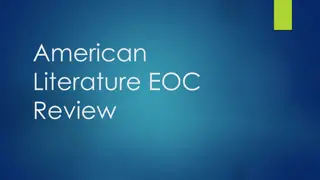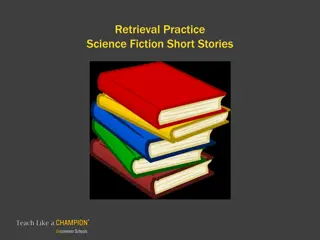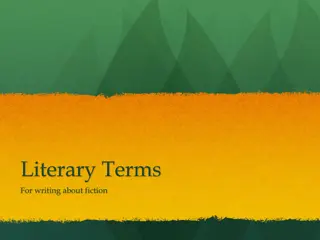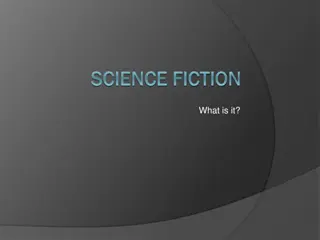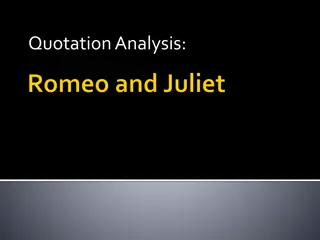American Fiction: The Journey Through Literary Periods
Delve into the evolution of American fiction, from the Colonial Period to the present day, exploring themes, styles, and significant literary movements. Uncover the impact of migration waves, Puritan literature, and the concept of Manifest Destiny in shaping American literary identity.
Download Presentation

Please find below an Image/Link to download the presentation.
The content on the website is provided AS IS for your information and personal use only. It may not be sold, licensed, or shared on other websites without obtaining consent from the author.If you encounter any issues during the download, it is possible that the publisher has removed the file from their server.
You are allowed to download the files provided on this website for personal or commercial use, subject to the condition that they are used lawfully. All files are the property of their respective owners.
The content on the website is provided AS IS for your information and personal use only. It may not be sold, licensed, or shared on other websites without obtaining consent from the author.
E N D
Presentation Transcript
American Fiction Introduction Spring 2020 Dr. Angeliki Tseti
Periodisation The Colonial Period (1500-1830) The Post-Revolutionary Period of Romanticism and Transcedentalism leading almost up to the end of the 19th century. Realism and Naturalism (1870-1910) The Modernist period spanning roughly from the pre-WWI (turn of the century) years through to the interwar period and leading up to WWII The Post-war / contemporary period.
Migration Waves until American Revolution 1. Puritans arriving from eastern England to Massachusetts (Boston), 1629-1640; 2. Sir Walter Raleigh and friends of the court (Elizabeth I) in Virginia (1642-1675); 3. Colonizers arriving from the Midlands and Whales in the valley of Delaware (1675-1725); 4. Irish immigrants (Scottish Presbyterian roots) settling in the regions of the Appalachians: Ohio, New England, the Carolinas and Georgia (1718-1775).
Puritan Literature Shared Purpose Society based on the laws of God; History developing according to God s plan. Genres: mixture of travel accounts and religious writings. First books - diaries, travel guides, dealing with the experience of new comers. Style varied enormously from complex metaphysical poetry to homely journals and crushingly pedantic religious history. Themes: Life was seen as a test; failure led to eternal damnation and hellfire, and success to heavenly bliss. This world was an arena of constant battle between the forces of God and the forces of Satan.
Theopolis Americana John Winthrop: City on a Hill America s universalistic, religious mandate for the world: the belief that the country was destined by God to fulfill a particular destiny, that is to purify history and the world. Jeremiad = a long, literary work usually written in prose, in which the author bitterly laments the state of society and its morals in a serious tone of sustained invective, and always contains a prophecy of society's imminent downfall.
Manifest Destiny The settlers of the US were meant to expand across North America, in a mission to redeem and remake the West in the model of agrarian America, to instill the values and special virtues of American people and their institutions. The philosophy drove 19th- century U.S. territorial expansion and was used to justify the forced removal of Native Americans and other groups from their homes. Leading to the outbreak of the Civil War slavery cannot exist in Theopolis Americana
The Birth of a Nation 18thcentury America writing: Founding Fathers. Practical philosophers political pamphlets They both admired and were active in the European Age of Reason or Enlightenment . They shared the Enlightenment belief that human intelligence (or reason) could understand both nature and man. Man could improve himself. Constitution of 1789 = creating a happy society based on justice and freedom
The Short Story America s most identifiable homegrown literary genre. A compressed, unified, plotted form. At crossroads: sharing with the novel the medium of prose / making use of poetry s strategies (metaphor, suggestion) Meant to be read in a single sitting Designed to produce a single effect
Setting The place / space /time that a story takes place. It may be detailed or vague, concrete or indistinct
Two types of characters A type, stock, schematic, flat, static character A character who embodies a fixed set of characteristics or a stereotype of a general human validity which is often associated with a social class, age, role, or nationality. A simple character whose presence is to a large extent stable and predictable. A unique, complex, round, dynamic character An individual possessing unique qualities and a psychological complex personality. Such characters develop in terms of their emotion, reason, and will and are subject to inner conflicts and tensions. Their mood and their motivation is mostly unpredictable. Usually there are dynamic or round in the sense that they change through the course of the story.
Theme A broad idea, message, or lesson that is conveyed by a work. The message may be about life, society, or human nature. Themes often explore timeless and universal ideas and may be implied rather than stated explicitly.
Imagery The use of concrete details that appeal to the five senses, thereby allowing a writer to more easily communicate an experience
Point of View First-person - I the narrator is a character in the story who can reveal his/her own thoughts or feelings Third person Objective - the narrator can only report what s/he sees or hears Omniscient - all knowing - narrator who can go into the thoughts and feelings of all the characters Limited omniscient - knows all speech and actions of characters but thoughts and feelings of only one
Irony The contrast between what is expected or what appears to be, and what actually is Types of irony a) Verbal irony contrast of saying the opposite of what is actually meant b) Irony of situation based on the difference between the way events work out and what is expected to happen or what seems appropriate c) Irony of tone extends verbal irony to include lengthy passages or even an entire work in which an author expresses an attitude opposite of what he feels
